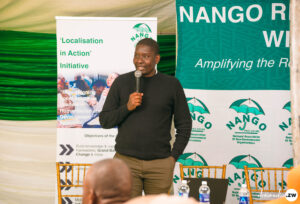Shifting Power and Practice Towards Genuine Localisation in Zimbabwe
Theme: Repositioning Local Actors as Leaders in Humanitarian and Development Action
The ‘Localisation in Action’ Initiative champions a bold shift in Zimbabwe’s development and humanitarian landscape—placing local actors at the forefront of decision-making, resource mobilisation, and project implementation.
Localisation is not only about transferring power—it is about restoring agency, enabling sustainability, and recognising the lived expertise of community-based organisations, local NGOs, and grassroots actors.

Tatenda Ruzawo | Trocaire, Presenting on the Localisation Agenda during the NANGO Annual Regional NGO Expo & Winter School 2025
“Local actors are not implementers of someone else’s agenda—they are leaders in their own right.”
Despite their critical role, local CSOs often remain on the margins of development discourse. Strategic decisions are made elsewhere, funding is channelled through intermediaries, and ownership of interventions is minimal. Localisation seeks to change this reality.
🚧 Key Challenges We’re Addressing
💬 Create a national platform for localisation dialogue, co-creation, and coordination
📚 Build knowledge of key frameworks (e.g. Grand Bargain, Charter for Change)
🤝 Promote equitable partnerships based on mutual respect and shared vision
📣 Advocate for Zimbabwe-specific localisation benchmarks
💡 Mobilise donors and INGOs to invest in local systems and leadership
If local CSOs are empowered, resourced, and included as co-leaders…
Then Zimbabwe will experience more equitable partnerships, stronger systems, and community-led impact that endures.
Our model is based on:
✅ National Localisation Survey – Mapping current practices, barriers & opportunities
✅ Localisation Taskforce – A multi-stakeholder platform for coordination & accountability
✅ Localisation Symposium – A national dialogue to build consensus on a Zimbabwe framework
✅ Capacity Strengthening Workshops – On leadership, funding readiness & mutual accountability
✅ Dialogue with Donors & INGOs – Structured engagement to shift funding practices
✅ Case Studies & Position Papers – Tracking and amplifying locally led success
✅ Integration into Flagship Events – Including NGO Expos, Winter Schools & Directors Retreat
📌 Increased knowledge of localisation among Zimbabwean CSOs
📌 Strengthened CSO leadership in national development dialogue
📌 Operational Zimbabwe Localisation Charter
📌 Equitable funding mechanisms adopted
📌 Donor and INGO practices shift toward local ownership
📌 Greater community ownership and sustainable impact
Led By: Local CSOs and CBOs under the NANGO platform
In Partnership With: INGOs, Donors, UN Agencies, Academia, and the Private Sector
We’re embedding this initiative into NANGO’s 2026–2030 Strategic Plan to ensure long-term integration and progress. Local CSOs will be empowered to advocate, monitor, and lead localisation efforts beyond the project lifespan.
Be part of the shift. Help build a Zimbabwean development model that values local knowledge, leadership, and ownership.